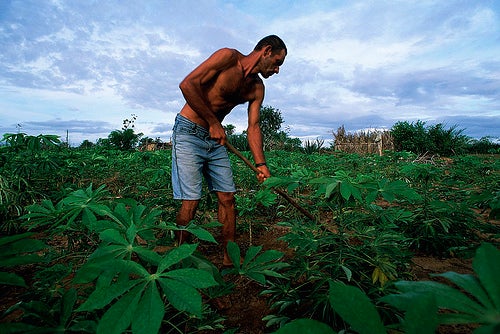
Linked in the distant past through colonial-era trade enterprises, Brazil and Africa are becoming close partners again. More than two centuries after establishing a slave trade route across the Atlantic, both regions are again re-engaging, this time to exchange knowledge and further economic and social development.
Sub-Saharan African countries are looking to replicate Brazil’s successes in boosting agricultural production and exports, and private investments, which have made Brazil a key economic player in the international arena. This is no coincidence. The world is going though rapid changes, resulting in a new financial architecture, with emerging economies and countries in the South increasingly participating and influencing global decisions.
South-south partnerships for development and growth are becoming more the norm than the exception, challenging the traditional approach to development cooperation based on “aid” form the North to the South.
Our report “Bridging the Atlantic: Brazil and Sub-Saharan Africa, South-South Partnering for Growth”, shows how south-south partnerships are effectively being forged by the two sides of the Atlantic, once united by the transatlantic slave trade. Knowledge exchange, trade and investments are the areas in which Sub-Saharan African countries and Brazil are building ties, highlights the report.
The emergence of Brazil as one of the world’s largest economies and its successes on several fronts attracted the attention of Sub-Saharan African countries. In less than 10 years, Brazil decreased social inequality by lifting 20 million Brazilians out of poverty into a middle class with access to formal jobs, health and education. The country is now one of the largest exporters of agricultural and food products like soya, coffee, sugar, chicken and meat.
In tropical medicine, Brazil is recognized worldwide by its advances in developing generic pharmaceuticals for combating HIV/AIDS and other tropical diseases. Sub-Saharan African countries are increasingly approaching Brazil to learn from these successes and the Amazon giant is willing to share them.
Brazil now has knowledge partnerships with 25 Sub-Saharan African countries. According to the report, trade between Brazil and Africa increased from US$2 billion to US$10 billion between 2000 and 2010. Brazilian investments in Africa are also increasing, with private sector companies active in infrastructure, mining, energy and agriculture. Traditionally present in Lusophone African, firms are now operating in Anglophone and Francophone countries as well.
Brazilian and African governments are working together to increase investments from Brazilian small and medium enterprises (SMEs). There are important challenges remaining to make investments flourish.
For example, information in Brazil about Africa and vice versa is still limited and telecommunication costs remain high compared to the United States and Europe, mainly due to monopolies. Maritime and air transport is not frequent enough and routes are still not direct. A cargo ship departing from a major Brazilian port like Rio de Janeiro or Santos, to Bissau should take 10 days but currently it takes 80 days due to bureaucracy and indirect routes. Flying from Brazil to Africa usually takes 30 hours connecting through Europe. A direct flight from Dakar to Recife in the north of Brazil would take three hours and five to Rio de Janeiro.
In 2013, a submarine cable of approximately 12,800 gigabytes will connect the south of Africa with the north of Brazil. This will improve Internet connections and hopefully the flow of information between business communities from the two sides. Brazilian President Dilma Rousseff has stated that Africa remains a priority for Brazil as well as Latin America. With African economies growing, more democratic regimes in power and fewer conflicts, the future for Brazilian and African partnerships remains positive.


Join the Conversation